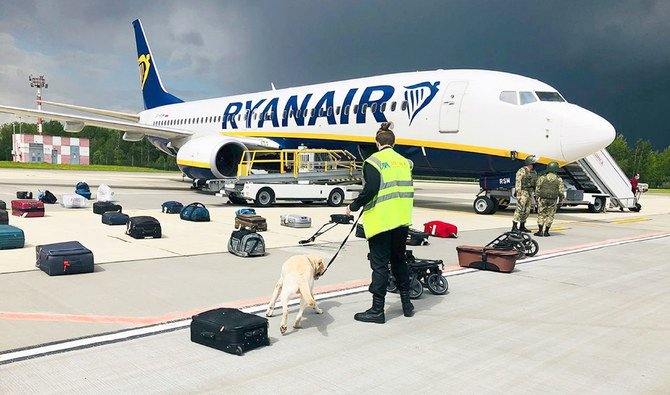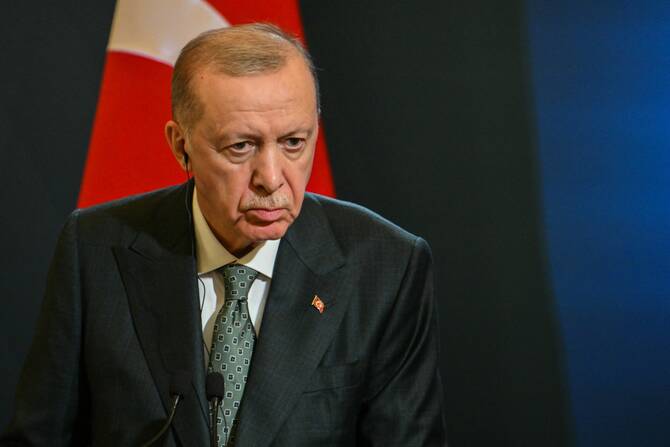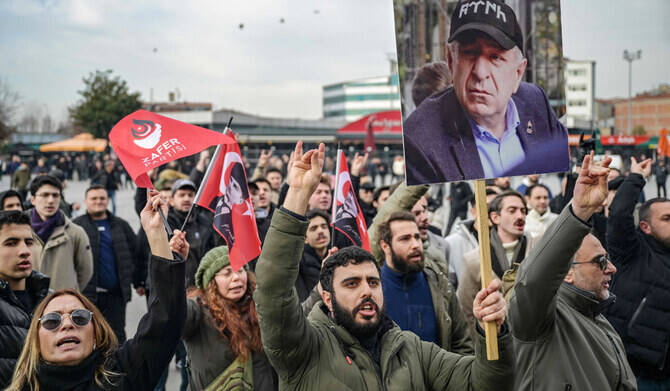ANKARA: Turkey convinced its NATO allies to opt for a milder official stance after Belarus forced down a European airliner passing through the country’s airspace so it could arrest a dissident journalist, Reuters reported on Thursday.
The Ryanair passenger plane was flying from Greece and bound for Lithuania, however Belarus diverted its route to force it to land in Minsk on Sunday.
In a two-paragraph statement released by NATO, the alliance condemned the arrest of the journalist Roman Protasevich after the forced landing, but it did not bring about the punitive sanctions that Poland, Lithuania and Latvia were pushing for.
The statement, which did not call for the release of political prisoners in Belarus, contradicts NATO Secretary-General Jens Stoltenberg’s declaration that the incident was “outrageous” and “a state hijacking.”
Diplomats quoted by Reuters claimed that Ankara might use its NATO leverage to consolidate its fragile ties with Moscow, a close ally of Belarus, to convince Moscow to allow Russian tourists to come to Turkey during the summer season despite the high risk of coronavirus infections.
Russian tourists favour Turkey as a top holiday destination, especially the country’s southern provinces, more than any other country, with 7 million visitors from the country recorded in 2019.
Moscow is expected to revise the one-and-half month ban on flights with Turkey that will expire on June 1.
However, on the diplomatic front, Turkey recently angered Russia over its rapprochement with Ukraine.
The Kremlin warned Ankara on May 24 that encouraging “aggressive” Ukrainian actions toward Crimea directly violated Russia’s territorial integrity. The Russian foreign minister criticized Turkey’s increased cooperation with Kiev, saying that it fuels “militaristic sentiment” in Ukraine.
Turkey’s alleged diplomatic move at NATO to prevent harsh sanctions against Belarus — probably a ban on Belarusian airlines flying over EU airspace or blocking Belarusian airlines from using EU airports — might also be aiming to boost economic cooperation with Minsk amid the financial hardship the country is facing during the pandemic.
Some experts, however, have underlined that this latest move within NATO hints at an attempt to balance the country’s geopolitical aims and economic necessities.
“Turkey is trying to preserve its ‘balancing act’ between NATO and Russia after it has been signaling during the last few weeks it was more willing to engage in the deterrence policy toward Russia, as evidenced by its outreach to Ukraine, drone sale to Poland and joining the NATO’s enhanced air policing,” Karol Wasilewski, an analyst at the Warsaw-based Polish Institute of International Affairs, told Arab News.
The Turkish Ministry of Foreign Affairs has remained silent about the Reuters’ report.
However, the Kremlin does not seem to appease its tension with Ankara with just a single move.
According to Wasilewski, any diplomatic move from Turkey to prevent sanctions against Belarus may calm Russia a little, but it will be enough to ease tensions.
“Russia is at the stage of signaling to Turkey that its actions will have consequences and this may continue until Turkey shows more clearly that its engagement in NATO won’t interfere in its policy toward Russia,” he said.
He added: “The bottom line is that Turkey continues its ‘eat a cake and have it too’ policy toward NATO and Russia. Moscow has been pretty much tolerant toward this policy, because for a long time it has had more negative consequences for NATO than for Russia.”
Turkey’s criticism of Moscow’s 2014 annexation of Crimea and its support for Ukraine’s territorial integrity is a source of annoyance for the Kremlin.
With Joe Biden’s administration now in the White House in the US, Wasilewski thinks that the equation has changed and that Moscow is interested in demonstrating to Turkey that this policy is no longer valid, especially if Turkey aims to modify its balancing act in a way that would have more negative consequences for Russia.
For Amanda Paul, senior policy analyst at the Brussels-based European Policy Center (EPC), it is disappointing that Ankara has taken this position, and the move has frustrated many in the Alliance.
“NATO should have delivered the strongest of responses to this outrageous incident. Of course, given the state of the Turkish economy these days, Ankara is focused on improving the situation,” she told Arab News.
When it comes to Belarus, Paul thinks that Turkey has been focused on strengthening economic — and other — ties over the past few years.
“In early May President Recep Tayyip Erdogan had a phone call with Alexander Lukashenka in which the two reiterated the intent to boost ties. That would indicate Turkey’s leadership has no problem in dealing with a man whose regime has beaten, and in some cases killed, peaceful protesters and now has hijacked a plane,” she said.






















